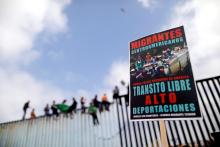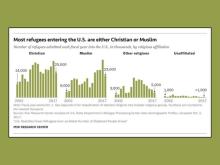immigrants

The decision to uphold President Donald Trump’s callous Muslim ban will be remembered in history alongside other cases where the highest court in the land failed deeply and shamefully to deliver justice, like Dred Scott when SCOTUS denied citizenship to anyone of African descent and Korematsu when SCOTUS upheld internment of Japanese Americans during WWII.

But in 2017, only 33,000 refugees resettled in the U.S., the country’s lowest total since the years following the Sept. 11 terrorist attacks and a sharp decline from 2016, when it resettled about 97,000.

Kevin Landy, a former ICE assistant director responsible for the Office of Detention Policy and Planning under the Obama administration, said the move to house so many detainees at once in federal prisons was “highly unusual” and raises oversight concerns.

Of the 43 percent who do not believe the U.S. has a responsibility to accept refugees, polling showed that no group agrees less with that idea than white evangelical Protestants, at 68 percent.

Calling people “animals” misses the mark on all of this, even if the comment only referred to gang members. No, we shouldn’t shrug at evil or avoid calling out awful things and people who are causing great suffering — an important part of our power with language. But even in naming evil we’re to be guided by love for the suffering and those who cause suffering. Jesus loved the criminal on the cross next to him on Golgotha. Each person is made in God’s image and loved by God.

Sister Pimentel spoke on her own experiences as a child of Mexican immigrants and urged graduates to listen to God's call to stand in solidarity with the vulnerable and to be a voice for the voiceless.

"I'm nervous. I'm afraid," said Linda Sonigo, 40, walking solemnly toward the U.S. gate with her two-year-old granddaughter in her arms. "I'm afraid they'll separate us," she said, motioning to her two children and grandchild.

JUST AFTER LUNCH, Eulalia Francisco shows Molly Hemstreet two pieces of white elastic bands, one of them slated for use as waistbands in a batch of woolen children’s pajamas being cut and sewed by the North Carolina-based, worker-owned cooperative Opportunity Threads.
Francisco, who had just two years of formal schooling in her native Guatemala, has noticed the elastic recommended for the sewing job is not the best choice for these pajamas. She recommends another elastic band.
Francisco is “our master sewer,” says Hemstreet, founder of Opportunity Threads, who agrees with Francisco’s suggestion and immediately orders the correct elastic.
After four years together, Francisco and Hemstreet, both worker-owners of Opportunity Threads, have a strong, trust-based working relationship. Hemstreet, an Episcopalian, earns the same wage as the other worker-owners and sees Opportunity Threads as having a spiritual component. “Before I met my husband, I thought deeply about going into cloistered work,” Hemstreet says. “I think of that whole thing of prayer and work, and that’s how I come here every day. We’re not making icons, but we’re doing work, and we do things in a joyful, prayerful way.”
The co-op grew from humble beginnings. After completing degrees in Spanish and Latin American studies at Duke University, Hemstreet moved with her husband, Francisco Risso, back to her hometown of Morganton, N.C., to open a Catholic Worker House. The local chicken plant hires many Latinos, but the work is hard and tedious, the pay not nearly a livable wage. So Hemstreet, with no formal training in business, explored the world of cooperatives, thinking it might be a good path to more meaningful and dignified employment for the Latino community.

Opponents fear the decision could result in a severe undercount that can lead to increased marginalization of immigrants by potentially reducing their representation in Congress and federal funding for local jurisdictions, which is determined by population.

In the wake of the Supreme Court ruling that delayed the Trump administration's March 5 deadline, leaders from the National Latino Evangelical Coalition, Esperanza, Christian Community Development Association, Bread for the World, as well as U.S. Catholic bishops referenced Matthew 25 to address the biblical calling to "treat the immigrant with dignity, respect and love, providing the same welcome that we ourselves would hope for."

If we don’t see you
In the mother pulled away from her child
In the father dragged from his home
In the child shivering in the detention center
Then we don’t see you at all.

"Non-citizens who receive public benefits are not self-sufficient and are relying on the U.S. government and state and local entities for resources instead of their families, sponsors or private organizations," the document states. "An alien's receipt of public benefits comes at taxpayer expense and availability of public benefits may provide an incentive for aliens to immigrate to the United States."

Blues legend Robert Johnson, the story goes, made a deal with the devil and sold his soul on a Mississippi highway to play virtuoso guitar. House Speaker Paul Ryan’s musical tastes reportedly lean more toward Metallica than the Delta blues, but he faces a crossroads of his own that will test whether he will trade in his values to the nativist wing of the Republican Party or do what’s right for young immigrants.

It’s not just the Dreamers who stand to lose if there are no new legislative protections put in place: It could have hefty economic consequences for states like North Carolina. Patrick McHugh, economic analyst for the progressive research and advocacy organization North Carolina Justice Center, said the Cato Institute (a libertarian think tank) predicted that ending DACA could cost North Carolina $7.8 billion in the next decade alone.

Francis celebrated a Mass marking the Roman Catholic Church's first yearly World Day of the Poor, which the pope established to draw the attention of the world's 1.2 billion Catholics to the neediest.

Legal proceedings revolve around intent. Intent is the difference between involuntary manslaughter and murder. Intent is the difference between a harmless literacy test and robbing people of the right to vote. Intent matters because intent shows us the naked truth behind what people do and say.

As the Trump administration continues to enforce a travel ban affecting six Muslim-majority and other countries, a Pew Research Center report tracking the influx of displaced people finds that 47 percent of refugee arrivals in fiscal 2017 were Christian and 43 percent were Muslim.

Enough of the church voted for a president that made such a decision among others, and those same churches, those same Christians, still uphold those decisions. As people who wish for a better America, we are called to remind one another that we belong to each other, no matter what race, religion, ethnicity, or sexual orientation.

Donald Trump’s fueling of racial fear and hate is being played out in our nation’s policies. Incredibly, Trump even justified the Arpaio pardon by saying it got high “ratings” from his constituency. He ran on a platform of anti-immigrant hostility — much like Arpaio — and his base is expecting him to deliver. And now 800,000 lives hang in the balance.

In the midst of a raging discussion about what it means to be American, it is worthwhile to reflect on the profound ambivalence of American civil religion — perhaps the most powerful force for creating a shared national identity.
In 1967, Robert N. Bellah’s seminal essay, “Civil Religion in America,” created a template for how both the right and the left defined civil religion to cultivate a sense of belonging, particularly in an era of turbulence. During this period of increasing polarization, Bellah’s words are more relevant than ever.